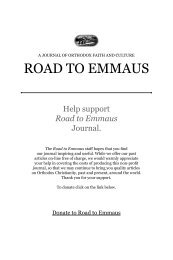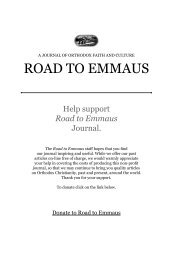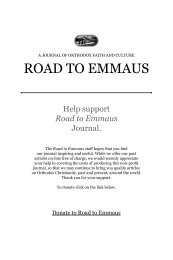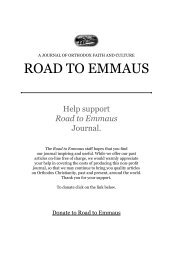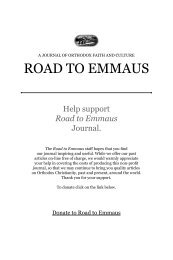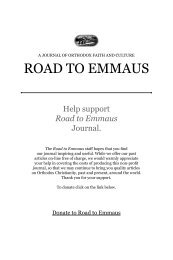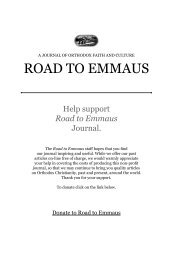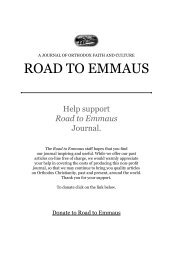<strong>Road</strong> <strong>to</strong> <strong>Emmaus</strong> Vol. 2, <strong>No</strong>. 3 (#6)Orthodoxy in IndonesiaThomas: So local parishes will be able <strong>to</strong> celebrate in their own language?Fr. Daniel: Yes. And if there is a need, they can always celebrate in Indonesian.Thomas: A more personal question for you. What are the greatest temptationsin your work?Fr. Daniel: (Laughs) To leave it because it is <strong>to</strong>o difficult. I know that I have mytalent, and that I can always teach. Sometimes I just want <strong>to</strong> go be a professorat the university. Again and again, God has helped me <strong>to</strong> stay where I am, <strong>to</strong>remember my calling. It is difficult because I have a lot of responsibility <strong>to</strong> payfor this or that, <strong>to</strong> help young people begin theological study at the university.I must pay for these things every month. I think I have more responsibilitiesthan people who have their own children!Thomas: What is your greatest sorrow?Fr. Daniel: My greatest sorrow . . .when I’m trying <strong>to</strong> do my best, and I amaccused of things that I did not do.Thomas: And your greatest joy?Fr. Daniel: The greatest joy is when someone is converted <strong>to</strong> Orthodoxy.Thomas: Who are the saints who have helped you, the ones you feel closest<strong>to</strong>?Fr. Daniel: My own patron saint, St. Daniel the Prophet. I chose that namebecause I believe that he had such a strong heart. He had courage against theking and the lions; and I am living among the lions, let me tell you. I want<strong>to</strong> have his courage.Thomas: Being a Semitic-oriented people and having less exposure <strong>to</strong> thesaints of traditional Orthodox lands, would you say that Indonesian Orthodoxare more drawn <strong>to</strong> the Old Testament saints?Fr. Daniel: Prophet Daniel was my choice, not for Indonesians in general. Iencourage people <strong>to</strong> be close <strong>to</strong> their own particular saints. For the time being,the spiritual orientation of the Indonesian people is not so much in the directionof the saints as it is <strong>to</strong> the Holy Scripture itself. This is still the foundation.Thomas: The traditional orientation reflects a more Islamic pattern with aChristian substance?Fr. Daniel: Yes. I’m speaking here not of the belief but of the pattern. Onehas <strong>to</strong> introduce things slowly. There is less emphasis on the saints, althoughthe Orthodox, of course, believe in them and they have their names. In ourcultural traditions we also have an understanding of sacred places, especiallygraveyards, the burial place of local saintly figures. This is not strange <strong>to</strong> us, itis not new <strong>to</strong> our culture. But I’m afraid that new converts look at the saintsin their old way of understanding – the dead people in their past, the worshipof ances<strong>to</strong>rs. This is a concern here, as it is in a lot of native cultures. So, I try<strong>to</strong> emphasize more the understanding of Scripture in the light of Orthodoxbelief.Thomas: As someone who has traveled extensively and seen Orthodoxy inmany places, do you have a word for people in the West? What can we do <strong>to</strong>deepen our faith?Fr. Daniel: As Westerners, <strong>to</strong> deepen your faith you must go back and explorethe original Western culture that was sanctified by Orthodoxy, the Christiansociety that was oriented <strong>to</strong>wards God. These are your roots. From there, try<strong>to</strong> sanctify the culture you are in. Don’t let yourselves be eroded by contemporaryWestern culture, which is very shallow. Also, try <strong>to</strong> be true <strong>to</strong> the Faithas such, don’t try <strong>to</strong> “revise” it according <strong>to</strong> the mode of the time. If you donot keep the Faith as it is, you will be undone by your surroundings. Try <strong>to</strong>interpret your life within the context of your faith. When people do not haveculture, they do not have a root – when they do not have a root, they areshallow. If Orthodoxy is only unders<strong>to</strong>od superficially, outside of the contex<strong>to</strong>f its his<strong>to</strong>rical rootedness, then we also become shallow – it is just a fad, likeany “new” religion. We have <strong>to</strong> be able <strong>to</strong> identify ourselves with the wholeflow of his<strong>to</strong>ry within the Church. I think that it is very important <strong>to</strong> acquireour identity within the Church.Thomas: So that means going “against the flow” because Western cultures arefor the most part losing their Christian world-view.Fr. Daniel: Of course. It is difficult, but the Lord went against the flow, didn’tHe? Yes, He did.Thomas: In our age of electronic communication, how can Orthodoxy adapt<strong>to</strong> a technological society and yet not partake of its aimlessness?Fr. Daniel: Use the means available as a vehicle. Use the Internet as much aspossible for preaching Orthodoxy, use television as much as possible <strong>to</strong> reachpeople. This is better than just letting the Hindu gurus or whoever take it over.Why shouldn’t we make use of it? We waste a lot of opportunity if we don’t.Thomas: Do you think there is a boundary, past which Orthodoxy shouldn’tintegrate with the media?
<strong>Road</strong> <strong>to</strong> <strong>Emmaus</strong> Vol. 2, <strong>No</strong>. 3 (#6)Orthodoxy in IndonesiaFr. Daniel: Yes, when we interpret our lives in terms of that media. But whenwe use this <strong>to</strong>ol and fill it with a new meaning, the Orthodox Christian worldview,then it becomes an instrument for Orthodoxy.Thomas: One more question about intercultural relationships. Many of usknow little more about Asian spirituality than the contemporary popularpresentation of “Eastern religions” that has <strong>to</strong>rn many Westerners from theirroots, and substituted a blend of pseudo-mysticism and esoteric dead ends.What of real spiritual value can the West learn from the East?Fr. Daniel: A lot. A major lesson is the steadfastness of the Eastern peoplein their religiosity. The Eastern people are very religious in many ways, andit is very strange for Indonesians <strong>to</strong> hear from Western people that they don’tbelieve in God. It is very strange for us, because for us Asian people, God isso obvious. How can anyone not believe in Him? The grandeur of natureand everything right before you? How is it possible?! So, if you deny Him,you are left with only your own small mind, and you are very limited. But,that you cannot see the Hand of the Maker behind the grandeur of nature!It is difficult for me especially <strong>to</strong> understand this Western way of thinking. Iunderstand much through reading and my travels, but still, it is strange thatpeople cannot believe in God. I think this is not only a matter of mind, buta matter Fr. Daniel of heart. baptising The new heart converts becomes callous.For Eastern people, the reference is immediately <strong>to</strong> God. Either <strong>to</strong> God or <strong>to</strong>gods, but still, the reference point is spiritual.Thomas: Is there anything else that you would like <strong>to</strong> say, any message <strong>to</strong> thepeople reading this interview?Fr. Daniel: I want <strong>to</strong> encourage Orthodox people all over the world <strong>to</strong> feelthe unity of Orthodoxy. It is evil that Orthodoxy is so divided along the lineof cultures and ethnicity. I want <strong>to</strong> see the Orthodox feel a oneness: when theOrthodox people in Greece, or Russia, or Indonesia, hearing of the sufferingof others, can feel and say, “This my brother.” <strong>No</strong>ne of this, “You are Greekand I am Russian,” or, “I’m sorry, I’m Indonesian.” What kind of Orthodoxy isthis? It’s not catholic, not universal. The compartmentalization of Orthodoxyis not Orthodoxy.Thomas: This division is even more visible as our world comes closer <strong>to</strong>gether.Fr. Daniel: Yes. The second thing I would like <strong>to</strong> say is that I want Orthodoxpeople <strong>to</strong> be enthusiastic about their faith. To preach the Gospel – <strong>to</strong> preach itand not just keep it close and say, “This is mine, my culture.” Also, when youpreach Orthodoxy, don’t preach your particular expression of Orthodoxy – thatsomeone has <strong>to</strong> be Greek or Russian. Orthodoxy is not Greek or Russian; it isuniversal and for everyone. If you become Orthodox, do not associate yourselfprimarily with being Greek or Russian – associate yourself with the Church.This is the way it has <strong>to</strong> be. When I converted <strong>to</strong> Orthodoxy in Korea, I didnot associate Orthodoxy with any particular culture, I associated Orthodoxywith the whole his<strong>to</strong>ry of the Church. Orthodoxy has the responsibility <strong>to</strong>come out of its own cocoon, <strong>to</strong> tell the world, “Here we are!”Thomas: Don’t you think that our own time is especially good for this becausewe are being forced <strong>to</strong>gether in<strong>to</strong> a so-called “global village?”Fr. Daniel: I think so, yes. But then again, I believe that among all the Orthodoxethnic groups, there have always been people who have unders<strong>to</strong>odthis, and these people now have <strong>to</strong> take the lead in bringing Orthodox people<strong>to</strong>gether across ethnic and cultural lines. If not, the new Orthodox Churchesin Asia and in Africa will be very troubled. Speaking as an Asian, we don’t wanta new kind of colonialism. I want <strong>to</strong> warn the people from Western countrieswho are Orthodox and who want <strong>to</strong> do missionary work in Asia or in Africa– do not try <strong>to</strong> impose your own brand of spiritual colonialism. We havehad a long his<strong>to</strong>ry of colonialism and we will resist it. If traditional culture issuppressed and if there is a lack of recognition of local leadership, the nativeChristians will eventually revolt. This is no longer the time of “You are lower
- Page 1 and 2:
A JOURNAL OF ORTHODOX FAITH AND CUL
- Page 3 and 4:
CHRIST,THE MEDICINEOF LIFE:The Syri
- Page 5 and 6:
Road to Emmaus Vol. VI, No. 1 (#20)
- Page 7 and 8:
Road to Emmaus Vol. VI, No. 1 (#20)
- Page 9 and 10:
CHRIST, THE MEDICINE OF LIFEterrors
- Page 11 and 12:
Road to Emmaus Vol. VI, No. 1 (#20)
- Page 13 and 14:
Road to Emmaus Vol. VI, No. 1 (#20)
- Page 15 and 16:
CHRIST, THE MEDICINE OF LIFEfallen
- Page 17 and 18:
Road to Emmaus Vol. VI, No. 1 (#20)
- Page 20 and 21:
Road to Emmaus Vol. VI, No. 1 (#20)
- Page 22 and 23:
Road to Emmaus Vol. VI, No. 1 (#20)
- Page 24 and 25:
CroaghPatrick:The GloriousClimb ofI
- Page 26 and 27:
Road to Emmaus Vol. XII, No. 2 (#45
- Page 28 and 29:
Road to Emmaus Vol. XII, No. 2 (#45
- Page 30 and 31:
Road to Emmaus Vol. XII, No. 2 (#45
- Page 32 and 33:
Road to Emmaus Vol. XII, No. 2 (#45
- Page 34 and 35:
Road to Emmaus Vol. XII, No. 2 (#45
- Page 36 and 37:
Road to Emmaus Vol. XII, No. 2 (#45
- Page 38 and 39:
Road to Emmaus Vol. XII, No. 2 (#45
- Page 40 and 41:
Road to Emmaus Vol. XII, No. 2 (#45
- Page 42 and 43:
Road to Emmaus Vol. XII, No. 2 (#45
- Page 44 and 45:
THEASTONISHINGMISSIONARYJOURNEYS OF
- Page 46 and 47:
the astonishing missionary journeys
- Page 48 and 49:
Road to Emmaus Vol. V, No. 4 (#19)a
- Page 51:
Road to Emmaus Vol. V, No. 4 (#19)t
- Page 55 and 56:
Road to Emmaus Vol. V, No. 4 (#19)t
- Page 57 and 58:
the astonishing missionary journeys
- Page 59 and 60:
the astonishing missionary journeys
- Page 61 and 62:
the astonishing missionary journeys
- Page 64 and 65:
Road to Emmaus Vol. V, No. 4 (#19)t
- Page 66 and 67:
Road to Emmaus Vol. V, No. 4 (#19)t
- Page 68 and 69:
Road to Emmaus Vol. V, No. 4 (#19)t
- Page 70 and 71:
Road to Emmaus Vol. V, No. 4 (#19)t
- Page 72 and 73:
Road to Emmaus Vol. XI, No. 4 (#43)
- Page 74 and 75:
Road to Emmaus Vol. XI, No. 4 (#43)
- Page 76 and 77:
Road to Emmaus Vol. XI, No. 4 (#43)
- Page 78 and 79:
Road to Emmaus Vol. XI, No. 4 (#43)
- Page 80 and 81: Road to Emmaus Vol. XI, No. 4 (#43)
- Page 82 and 83: Road to Emmaus Vol. XI, No. 4 (#43)
- Page 84 and 85: Road to Emmaus Vol. XI, No. 4 (#43)
- Page 86 and 87: Road to Emmaus Vol. XI, No. 4 (#43)
- Page 88 and 89: Road to Emmaus Vol. XI, No. 4 (#43)
- Page 90 and 91: Road to Emmaus Vol. XI, No. 4 (#43)
- Page 92 and 93: NaturalConception,Natural Birth:The
- Page 94 and 95: Road to Emmaus Vol. XIII, No. 2 (#4
- Page 96 and 97: Road to Emmaus Vol. XIII, No. 2 (#4
- Page 98 and 99: Road to Emmaus Vol. XIII, No. 2 (#4
- Page 100 and 101: Road to Emmaus Vol. XIII, No. 2 (#4
- Page 102 and 103: Road to Emmaus Vol. XIII, No. 2 (#4
- Page 104 and 105: Road to Emmaus Vol. XIII, No. 2 (#4
- Page 106 and 107: Road to Emmaus Vol. XIII, No. 2 (#4
- Page 108 and 109: Road to Emmaus Vol. XIII, No. 2 (#4
- Page 110 and 111: Road to Emmaus Vol. XII, No. 1 (#44
- Page 112 and 113: Road to Emmaus Vol. XII, No. 1 (#44
- Page 114 and 115: Road to Emmaus Vol. XII, No. 1 (#44
- Page 116 and 117: Road to Emmaus Vol. XII, No. 1 (#44
- Page 118 and 119: Road to Emmaus Vol. XII, No. 1 (#44
- Page 120 and 121: Road to Emmaus Vol. XII, No. 1 (#44
- Page 122 and 123: Road to Emmaus Vol. XII, No. 1 (#44
- Page 124 and 125: Orthodoxy in IndonesiaAn Interview
- Page 126 and 127: Road to Emmaus Vol. 2, No. 3 (#6)Or
- Page 128 and 129: Road to Emmaus Vol. 2, No. 3 (#6)Or
- Page 132 and 133: 18 Road to Emmaus, Vol. 2, No. 3 (#
- Page 134 and 135: Road to Emmaus Vol. VII, No. 1 (#24
- Page 136 and 137: Road to Emmaus Vol. VII, No. 1 (#24
- Page 138 and 139: Road to Emmaus Vol. VII, No. 1 (#24
- Page 140 and 141: Road to Emmaus Vol. VII, No. 1 (#24
- Page 142 and 143: Road to Emmaus Vol. VII, No. 1 (#24
- Page 144 and 145: Road to Emmaus Vol. VII, No. 1 (#24
- Page 146 and 147: Road to Emmaus Vol. VII, No. 1 (#24
- Page 148 and 149: Road to Emmaus Vol. III, No. 3 (#10
- Page 150 and 151: Road to Emmaus Vol. III, No. 3 (#10
- Page 152 and 153: FROM JAINISM TOORTHODOXY:AN INDIANP
- Page 154 and 155: Road to Emmaus Vol. VI, No. 2 (#21)
- Page 156 and 157: FROM JAINISM TO ORTHODOXYDigambara
- Page 158 and 159: Road to Emmaus Vol. VI, No. 2 (#21)
- Page 160 and 161: FROM JAINISM TO ORTHODOXYELESA: Tha
- Page 162 and 163: Road to Emmaus Vol. VI, No. 2 (#21)
- Page 164 and 165: FROM JAINISM TO ORTHODOXYGrowing up
- Page 166 and 167: Road to Emmaus Vol. VI, No. 2 (#21)
- Page 168 and 169: FROM JAINISM TO ORTHODOXYELESA: Yes
- Page 170 and 171: Road to Emmaus Vol. VI, No. 2 (#21)
- Page 172 and 173: FROM JAINISM TO ORTHODOXYELESA: Not
- Page 174 and 175: THE GOLDENTHREAD OFFAITH:MENTAL ILL
- Page 176 and 177: Road to Emmaus Vol. V, No. 2 (#17)t
- Page 178 and 179: the golden thread of faithare usual
- Page 180 and 181:
Road to Emmaus Vol. V, No. 2 (#17)b
- Page 182 and 183:
the golden thread of faitha great s
- Page 184 and 185:
Road to Emmaus Vol. V, No. 2 (#17)t
- Page 186 and 187:
Road to Emmaus Vol. X, No. 1 (#36)a
- Page 188 and 189:
Road to Emmaus Vol. X, No. 1 (#36)a
- Page 190 and 191:
Road to Emmaus Vol. X, No. 1 (#36)r
- Page 192 and 193:
Road to Emmaus Vol. X, No. 1 (#36)T
- Page 194 and 195:
Road to Emmaus Vol. X, No. 1 (#36)r
- Page 196 and 197:
Road to Emmaus Vol. X, No. 1 (#36)T
- Page 198 and 199:
Road to Emmaus Vol. VIII, No. 2 (#2
- Page 200 and 201:
Road to Emmaus Vol. VIII, No. 2 (#2
- Page 202 and 203:
Road to Emmaus Vol. VIII, No. 2 (#2
- Page 204 and 205:
…Krom, he who has been born in yo
- Page 206 and 207:
Abandoned Church of St. Theodore, S
- Page 208 and 209:
FAITH UNSEENMany of these crypto-Ch
- Page 210 and 211:
Old aerial view of Kromni, early 20
- Page 212 and 213:
FAITH UNSEENCrypto-Christian Baptis
- Page 214 and 215:
St. Gregory of Nyssa Church, 1930,
- Page 216 and 217:
FAITH UNSEENO Bride, keep your husb
- Page 218 and 219:
Panagia Soumela Monastery, where ma
- Page 220 and 221:
FAITH UNSEENsaid, “What I am tell
- Page 222 and 223:
Greek hunting party with visiting R
- Page 224 and 225:
FAITH UNSEENAnas of 795 AD still he
- Page 226 and 227:
Trebizond (Trabzon) city walls.
- Page 228 and 229:
FAITH UNSEENOttoman administrator,



